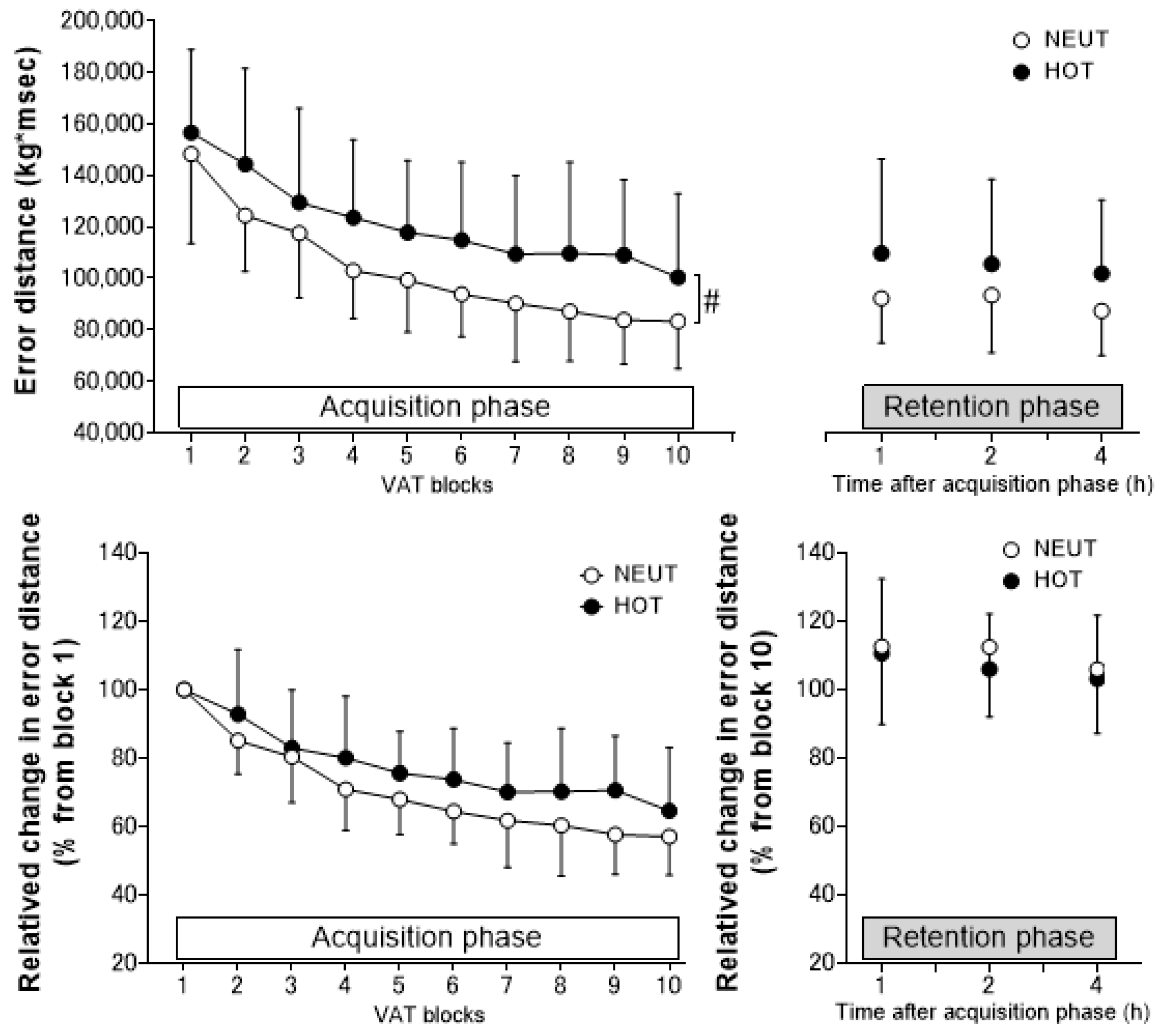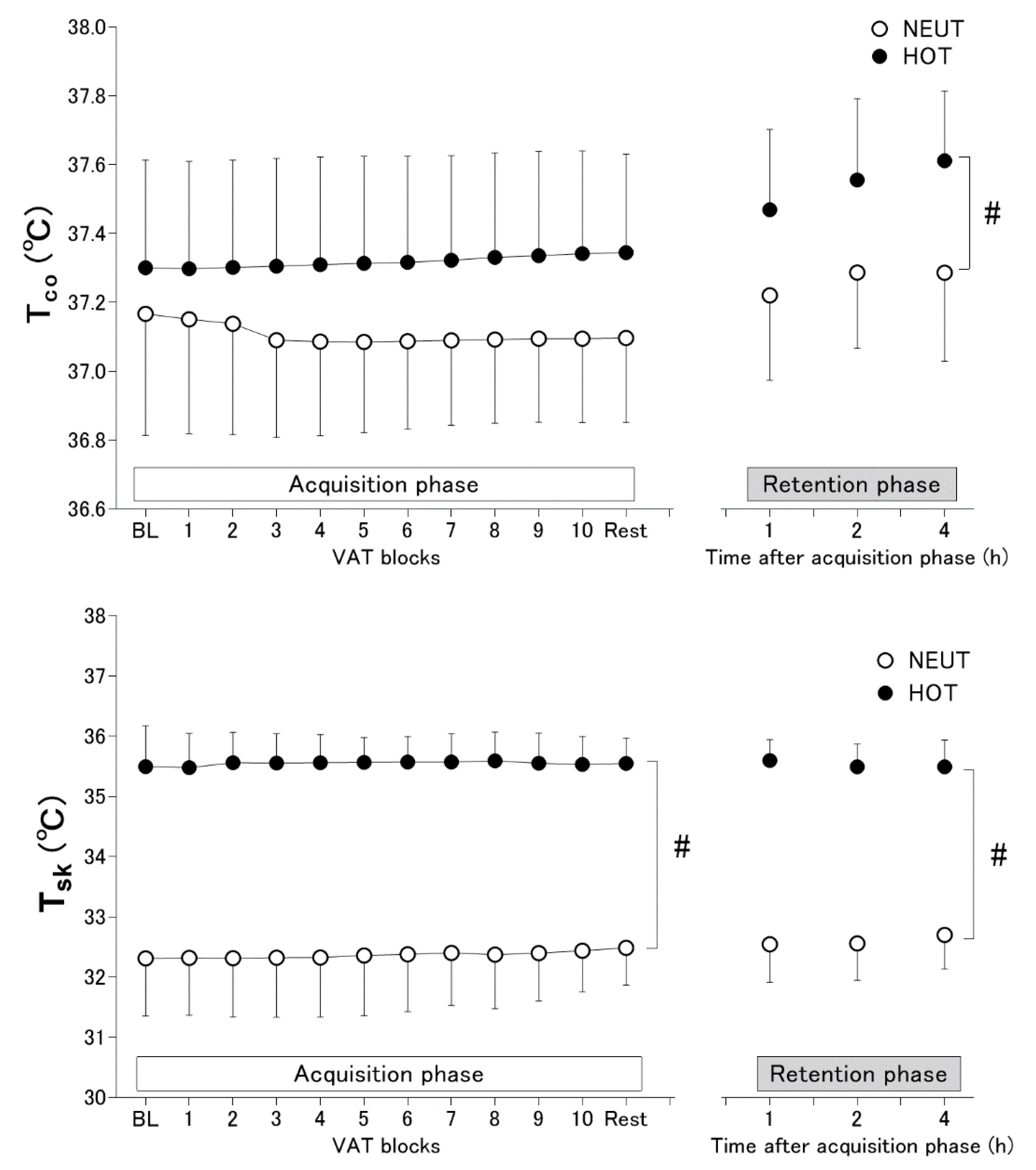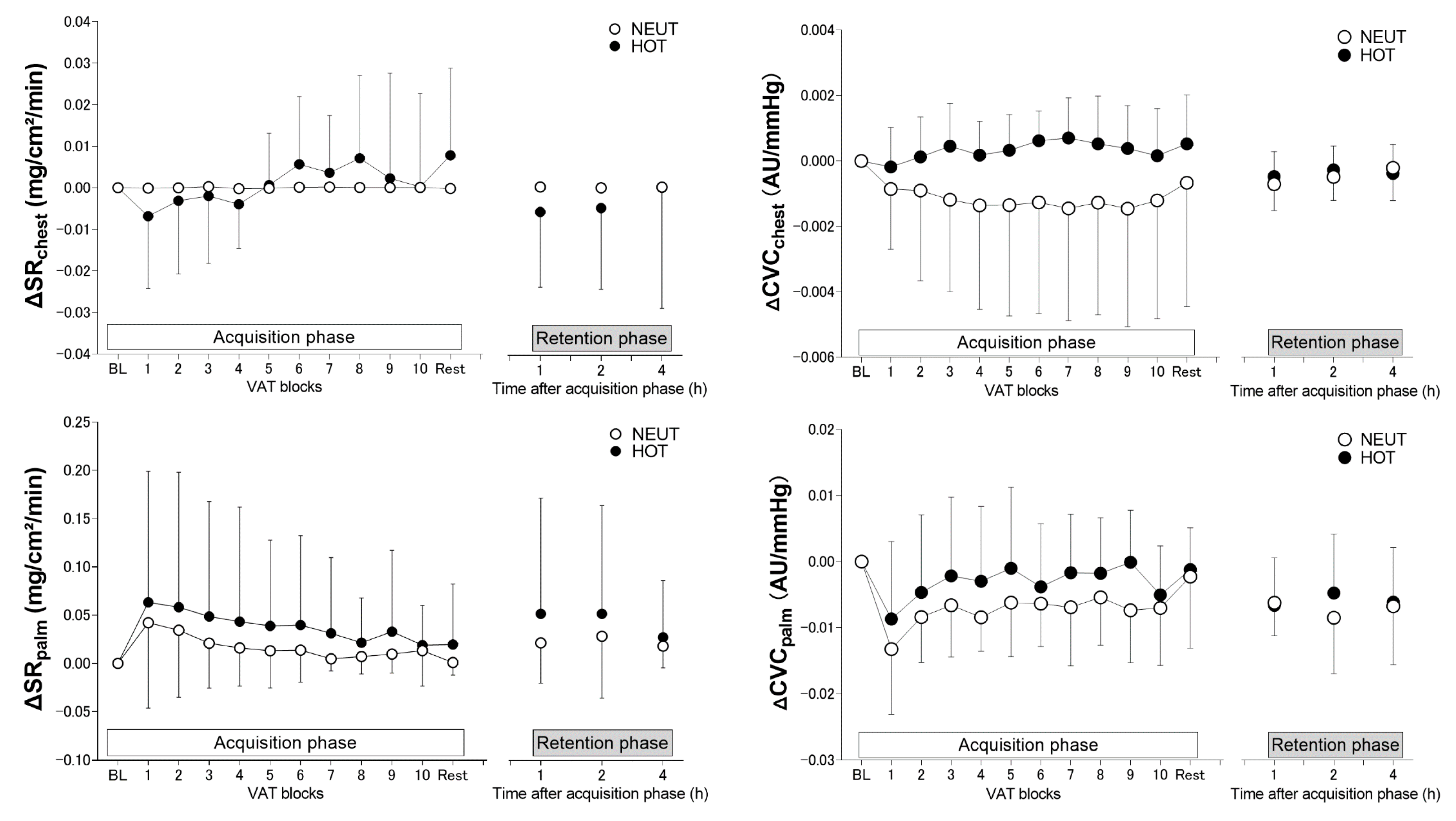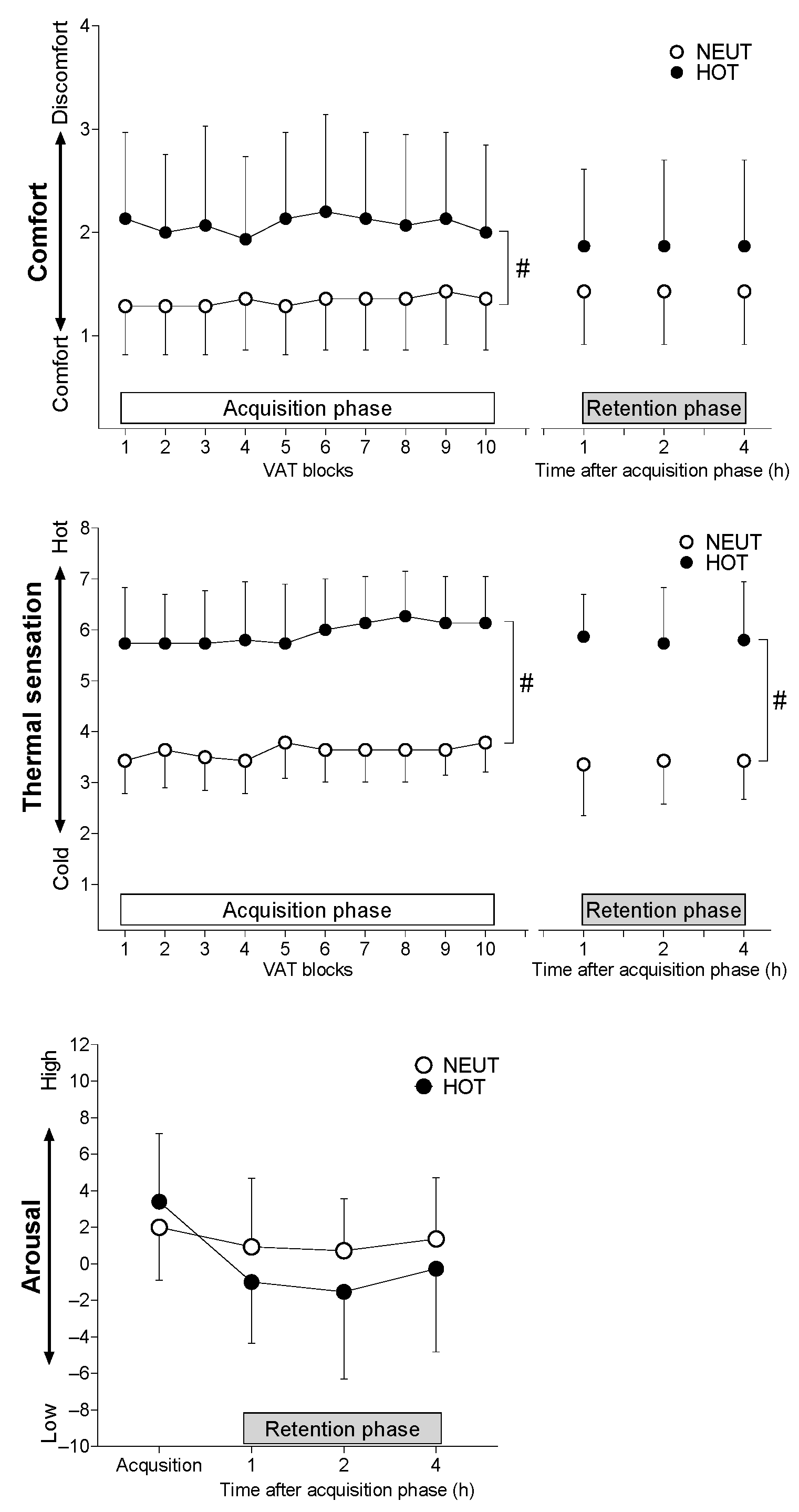Influence of Heat Exposure on Motor Control Performance and Learning as Well as Physiological Responses to Visuomotor Accuracy Tracking Task
Abstract
:1. Introduction
2. Materials and Methods
2.1. Ethical Approval
2.2. Participants
2.3. Experimental Protocol
2.4. VAT Task
2.5. Measurements
2.6. Data and Statistical Analysis
3. Results
3.1. VAT Task Performance
3.2. Core Body and Skin Temperatures
3.3. Cardiovascular Responses
3.4. Thermoregulatory Responses
3.5. Subjective Variables
3.6. Other Variables
4. Discussion
4.1. Effects of Heat Exposure on VAT Performance and Learning
4.2. Effects of Heat Exposure on Cardiovascular and Thermoregulatory Responses to the VAT Trial
4.3. Perspectives and Significance
4.4. Limitations
5. Conclusions
Author Contributions
Funding
Institutional Review Board Statement
Informed Consent Statement
Data Availability Statement
Acknowledgments
Conflicts of Interest
References
- Gonzalez-Alonso, J.; Teller, C.; Andersen, S.L.; Jensen, F.B.; Hyldig, T.; Nielsen, B. Influence of body temperature on the development of fatigue during prolonged exercise in the heat. J. Appl. Physiol. 1999, 86, 1032–1039. [Google Scholar] [CrossRef] [PubMed]
- Ely, B.R.; Cheuvront, S.N.; Kenefick, R.W.; Sawka, M.N. Aerobic performance is degraded, despite modest hypothermia, in hot environments. Med. Sci. Sports Exerc. 2010, 42, 135–141. [Google Scholar] [CrossRef]
- Gaoua, N.; Racinais, S.; Grantham, J.; El Massioui, F. Alterations in cognitive performance during passive hyperthermia are task dependent. Int. J. Hyperth. 2011, 27, 1–9. [Google Scholar] [CrossRef]
- Piil, J.F.; Lundbye-Jensen, J.; Christiansen, L.; Ioannou, L.; Tsoutsoubi, L.; Dallas, C.N.; Mantzios, K.; Flouris, A.D.; Nybo, L. High prevalence of hypohydration in occupations with heat stress—Perspectives for performance in combined cognitive and motor tasks. PLoS ONE 2018, 13, e0205321. [Google Scholar] [CrossRef] [PubMed]
- Schlader, Z.J.; Gagnon, D.; Adams, A.; Rivas, E.; Cullum, C.M.; Crandall, C.G. Cognitive and perceptual responses during passive heat stress in younger and older adults. Am. J. Physiol.-Regul. Integr. Comp. Physiol. 2015, 308, R847–R854. [Google Scholar] [CrossRef] [PubMed]
- McMorris, T.; Swain, J.; Smith, M.; Corbett, J.; Delves, S.; Sale, C.; Harris, R.C.; Potter, J. Heat stress, plasma concentrations of adrenaline, noradrenaline, 5-hydroxytryptamine and cortisol, mood state and cognitive performance. Int. J. Psychophysiol. 2006, 61, 204–215. [Google Scholar] [CrossRef] [PubMed]
- Taylor, L.; Watkins, S.L.; Marshall, H.; Dascombe, B.J.; Foster, J. The impact of different environmental conditions on cognitive function: A focused review. Front. Physiol. 2016, 6, 372. [Google Scholar] [CrossRef]
- Schmit, C.; Hausswirth, C.; Le Meur, Y.; Duffield, R. Cognitive functioning and heat strain: Performance responses and protective strategies. Sports Med. 2017, 47, 1289–1302. [Google Scholar] [CrossRef]
- Gaoua, N.; Grantham, J.; El Massioui, F.; Girard, O.; Racinais, S. Cognitive decrements do not follow neuromuscular alterations during passive heat exposure. Int. J. Hyperth. 2011, 27, 10–19. [Google Scholar] [CrossRef]
- Gaoua, N.; Grantham, J.; Racinais, S.; El Massioui, F. Sensory displeasure reduces complex cognitive performance in the heat. J. Environ. Psychol. 2012, 32, 158–163. [Google Scholar] [CrossRef]
- Anguera, J.A.; Reuter-Lorenz, P.A.; Willingham, D.T.; Seidler, R.D. Contributions of spatial working memory to visuomotor learning. J. Cogn. Neurosci. 2010, 22, 1917–1930. [Google Scholar] [CrossRef] [PubMed]
- Hikosaka, O.; Nakamura, K.; Sakai, K.; Nakahara, H. Central mechanisms of motor skill learning. Curr. Opin. Neurobiol. 2002, 12, 217–222. [Google Scholar] [CrossRef]
- Doyon, J.; Benali, H. Reorganization and plasticity in the adult brain during learning of motor skills. Curr. Opin. Neurobiol. 2005, 15, 161–167. [Google Scholar] [CrossRef] [PubMed]
- Ikarashi, K.; Sato, D.; Iguchi, K.; Baba, Y.; Yamashiro, K. Menstrual cycle modulates motor learning and memory consolidation in humans. Brain Sci. 2020, 10, 696. [Google Scholar] [CrossRef] [PubMed]
- Roig, M.; Skriver, K.; Lundbye-Jensen, J.; Kiens, B.; Nielsen, J.B. A single bout of exercise improves motor memory. PLoS ONE 2012, 7, e44594. [Google Scholar] [CrossRef]
- Hirano, M.; Kubota, S.; Tanabe, S.; Koizume, Y.; Funase, K. Interactions among learning stage, retention, and primary motor cortex excitability in motor skill learning. Brain Stimul. 2015, 8, 1195–1204. [Google Scholar] [CrossRef]
- Kantak, S.S.; Winstein, C.J. Learning–performance distinction and memory processes for motor skills: A focused review and perspective. Behav. Brain Res. 2012, 228, 219–231. [Google Scholar] [CrossRef]
- Lin, C.H.; Fisher, B.E.; Winstein, C.J.; Wu, A.D.; Gordon, J. Contextual interference effect: Elaborative processing or forgetting-reconstruction? A post hoc analysis of transcranial magnetic stimulation-induced effects on motor learning. J. Mot. Behav. 2008, 40, 578–586. [Google Scholar] [CrossRef]
- Liu, K.; Sun, G.; Li, B.; Jiang, Q.; Yang, X.; Li, M.; Li, L.; Qian, S.; Zhao, L.; Zhou, Z. The impact of passive hyperthermia on human attention networks: An fMRI study. Behav. Brain Res. 2013, 243, 220–230. [Google Scholar] [CrossRef]
- Hocking, C.; Silberstein, R.B.; Lau, W.M.; Stough, C.; Roberts, W. Evaluation of cognitive performance in the heat by functional brain imaging and psychometric testing. Comp. Biochem. Physiol. Part A Mol. Integr. Physiol. 2001, 128, 719–734. [Google Scholar] [CrossRef]
- Klein, J.C.; Crandall, C.G.; Brothers, R.M.; Carter, J.R. Combined heat and mental stress alters neurovascular control in humans. J. Appl. Physiol. (1985) 2010, 109, 1880–1886. [Google Scholar] [CrossRef] [PubMed]
- Cui, J.; Shibasaki, M.; Low, D.A.; Keller, D.M.; Davis, S.L.; Crandall, C.G. Heat stress attenuates the increase in arterial blood pressure during the cold pressor test. J. Appl. Physiol. 2010, 109, 1354–1359. [Google Scholar] [CrossRef] [PubMed]
- Binder, K.; Gagnon, D.; Lynn, A.G.; Kondo, N.; Kenny, G.P. Heat stress attenuates the increase in arterial blood pressure during isometric handgrip exercise. Eur. J. Appl. Physiol. 2013, 113, 183–190. [Google Scholar] [CrossRef]
- Kondo, N.; Horikawa, N.; Aoki, K.; Shibasaki, M.; Inoue, Y.; Nishiyasu, T.; Crandall, C.G. Sweating responses to a sustained static exercise is dependent on thermal load in humans. Acta Physiol. Scand. 2002, 175, 289–295. [Google Scholar] [CrossRef]
- Piil, J.F.; Christiansen, L.; Morris, N.B.; Mikkelsen, C.J.; Ioannou, L.G.; Flouris, A.D.; Lundbye-Jensen, J.; Nybo, L. Direct exposure of the head to solar heat radiation impairs motor-cognitive performance. Sci. Rep. 2020, 10, 7812. [Google Scholar] [CrossRef] [PubMed]
- Kenefick, R.W.; Cheuvront, S.N. Hydration for recreational sport and physical activity. Nutr. Rev. 2012, 70, S137–S142. [Google Scholar] [CrossRef]
- Sakairi, Y.; Nakatsuka, K.; Shimizu, T. Development of the T wo-D imensional M ood S cale for self-monitoring and self-regulation of momentary mood states. Jpn. Psychol. Res. 2013, 55, 338–349. [Google Scholar] [CrossRef]
- Ramanathan, N.L. A new weighting system for mean surface temperature of the human body. J. Appl. Physiol. 1964, 19, 531–533. [Google Scholar] [CrossRef]
- Gagge, A.P.; Stolwijk, J.A.; Hardy, J.D. Comfort and thermal sensations and associated physiological responses at various ambient temperatures. Environ. Res. 1967, 1, 1–20. [Google Scholar] [CrossRef]
- Cabanac, M. Physiological Role of Pleasure: A stimulus can feel pleasant or unpleasant depending upon its usefulness as determined by internal signals. Science 1971, 173, 1103–1107. [Google Scholar] [CrossRef]
- Schlader, Z.J.; Lucas, R.A.; Pearson, J.; Crandall, C.G. Hyperthermia does not alter the increase in cerebral perfusion during cognitive activation. Exp. Physiol. 2013, 98, 1597–1607. [Google Scholar] [CrossRef] [PubMed]
- Dayan, E.; Cohen, L.G. Neuroplasticity subserving motor skill learning. Neuron 2011, 72, 443–454. [Google Scholar] [CrossRef] [PubMed]
- Taylor, N.A.; Tipton, M.J.; Kenny, G.P. Considerations for the measurement of core, skin and mean body temperatures. J. Therm. Biol. 2014, 46, 72–101. [Google Scholar] [CrossRef]
- Littmann, A.E.; Shields, R.K. Whole body heat stress increases motor cortical excitability and skill acquisition in humans. Clin. Neurophysiol. 2016, 127, 1521–1529. [Google Scholar] [CrossRef] [PubMed] [Green Version]






| Acquisition Phase | Retention Phase (Time after Acquisition Phase, h) | |||||
|---|---|---|---|---|---|---|
| 1 | 2 | 4 | ||||
| MAP (mmHg) | NEUT | 85.9 ± 6.0 | 86.3 ± 9.3 | 83.6 ± 9.7 | 89.0 ± 9.8 | |
| HOT | 82.7 ± 5.6 | 85.0 ± 11.8 | 88.3 ± 11.4 | 87.2 ± 12.3 | ||
| HR (bpm) | # | NEUT | 65.4 ± 7.5 | 64.3 ± 7.4 | 63.7 ± 7.1 | 65.3 ± 8.1 |
| HOT | 71.0 ± 7.4 | 71.2 ± 8.5 | 72.5 ± 9.8 | 71.8 ± 7.5 | ||
| SRchest (mg/cm2/min) | # | NEUT | 0.01 ± 0.00 | 0.01 ± 0.00 | 0.01 ± 0.00 | 0.01 ± 0.00 |
| HOT | 0.08 ± 0.05 | 0.09 ± 0.06 | 0.10 ± 0.06 | 0.10 ± 0.06 | ||
| SRpalm (mg/cm2/min) | # | NEUT | 0.04 ± 0.03 | 0.04 ± 0.04 | 0.05 ± 0.05 | 0.04 ± 0.04 |
| HOT | 0.14 ± 0.03 | 0.12 ± 0.09 | 0.14 ± 0.14 | 0.16 ± 0.22 | ||
| CVCchest (AU/mmHg) | NEUT | 0.011 ± 0.005 | 0.010 ± 0.003 | 0.010 ± 0.003 | 0.010 ± 0.003 | |
| HOT | 0.012 ± 0.004 | 0.012 ± 0.005 | 0.012 ± 0.004 | 0.013 ± 0.005 | ||
| CVCpalm (AU/mmHg) | # | NEUT | 0.026 ± 0.012 | 0.022 ± 0.010 | 0.022 ± 0.007 | 0.017 ± 0.009 |
| HOT | 0.004 ± 0.013 | 0.050 ± 0.013 | 0.046 ± 0.011 | 0.045 ± 0.014 | ||
Publisher’s Note: MDPI stays neutral with regard to jurisdictional claims in published maps and institutional affiliations. |
© 2022 by the authors. Licensee MDPI, Basel, Switzerland. This article is an open access article distributed under the terms and conditions of the Creative Commons Attribution (CC BY) license (https://creativecommons.org/licenses/by/4.0/).
Share and Cite
Aoki, M.; Yamazaki, Y.; Otsuka, J.; Okamoto, Y.; Takada, S.; Shirai, N.; Fujimoto, T.; Ochi, G.; Yamashiro, K.; Sato, D.; et al. Influence of Heat Exposure on Motor Control Performance and Learning as Well as Physiological Responses to Visuomotor Accuracy Tracking Task. Int. J. Environ. Res. Public Health 2022, 19, 12328. https://doi.org/10.3390/ijerph191912328
Aoki M, Yamazaki Y, Otsuka J, Okamoto Y, Takada S, Shirai N, Fujimoto T, Ochi G, Yamashiro K, Sato D, et al. Influence of Heat Exposure on Motor Control Performance and Learning as Well as Physiological Responses to Visuomotor Accuracy Tracking Task. International Journal of Environmental Research and Public Health. 2022; 19(19):12328. https://doi.org/10.3390/ijerph191912328
Chicago/Turabian StyleAoki, Mao, Yudai Yamazaki, Junto Otsuka, Yumi Okamoto, Shota Takada, Nobu Shirai, Tomomi Fujimoto, Genta Ochi, Koya Yamashiro, Daisuke Sato, and et al. 2022. "Influence of Heat Exposure on Motor Control Performance and Learning as Well as Physiological Responses to Visuomotor Accuracy Tracking Task" International Journal of Environmental Research and Public Health 19, no. 19: 12328. https://doi.org/10.3390/ijerph191912328
APA StyleAoki, M., Yamazaki, Y., Otsuka, J., Okamoto, Y., Takada, S., Shirai, N., Fujimoto, T., Ochi, G., Yamashiro, K., Sato, D., & Amano, T. (2022). Influence of Heat Exposure on Motor Control Performance and Learning as Well as Physiological Responses to Visuomotor Accuracy Tracking Task. International Journal of Environmental Research and Public Health, 19(19), 12328. https://doi.org/10.3390/ijerph191912328






